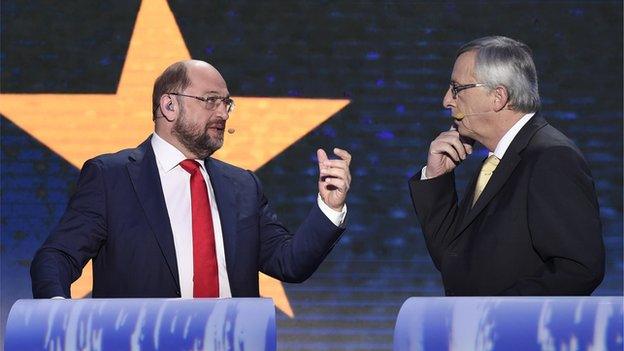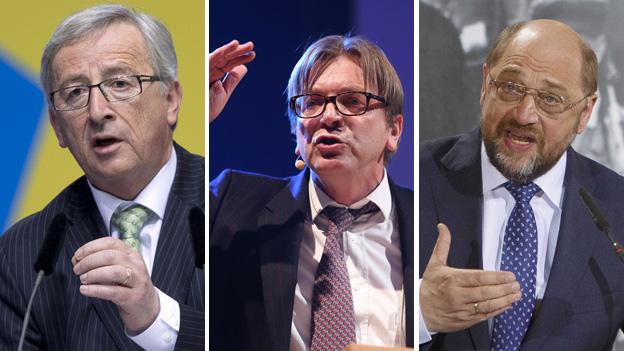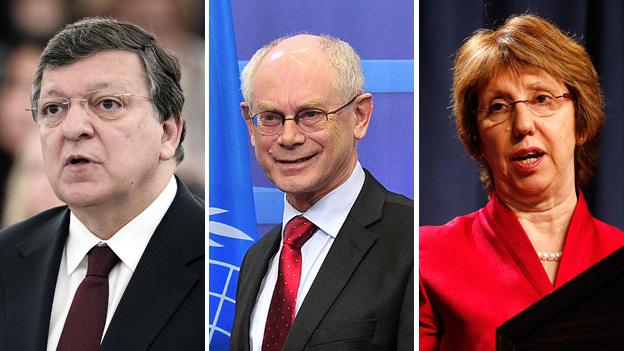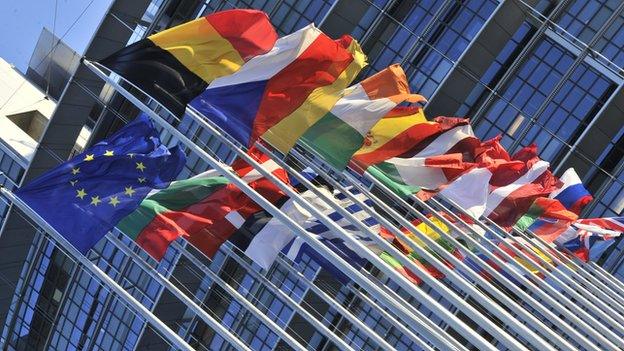EU election race: Europe's great debate?
- Published
- comments
The European economy dominated the candidates debate, as Gavin Hewitt reports
In the debating chamber of the European Parliament the stage was set. Five podiums in the spotlights and the blue gels.
A packed audience of the Brussels cognoscenti. Eurovision titles rolled and the evening was introduced as the TV moment in the European elections. This would be a great debate, external, aired in more than 30 countries, before an audience of 340 million potential voters.
On stage were five candidates for Europe's top job, President of the European Commission.
The idea, as promoted by the European Parliament, is that the party which gets the most seats in the elections wins the prize of selecting the EU's chief executive. Never mind the fact that European heads of government will get to make the choice - albeit in consultation with the parliament. Those arguments lie ahead.
Those banks again
So, back to the debate - except for the fact that there really wasn't one. There was no big clash of ideas or personalities. Nearly all the candidates believe that the answer to almost any problem lies with more Europe.
Guy Verhofstadt, the former Belgian prime minister and the Liberals' candidate, crackled with energy. He had come to argue. He is an unashamed federalist - "the choice", he said, was "to go back to the old nation states or have a more integrated Europe".
Ska Keller, the Greens' candidate, was fluent and persuasive, with wide support in the audience. She said at the outset "I'm fighting for people, not the banks". As the 90-minute debate wore on it was apparent that every candidate was there to rein in the banks.
The outsider was Alexis Tsipras, leader of Greece's radical left party Syriza. He ruffled some feathers when he denounced what he called "catastrophic austerity policies". He lacked some of his usual passion, but said that what had happened in Greece was "not a success story but a social tragedy that shouldn't be repeated anywhere in Europe".
He asked for a huge chunk of Greek debt (currently running at 177% of GDP) to be cancelled. None of the other candidates would engage with that.

Martin Schulz (left) and Jean-Claude Juncker lead the biggest blocs in the European Parliament
Struggle for Greece
The frontrunner (if there is one) is Jean-Claude Juncker, a former prime minister of Luxembourg and the candidate of the conservative European People's Party (EPP). He was subdued, but was goaded into saying how much he loved the Greeks and that "over the years I worked night and day, and more nights than days, to keep Greece in the euro… I did what I could to make Greece stay in the euro. I will never accept the charge that we lacked solidarity."
The fifth candidate was Martin Schulz, the Socialist (S&D) leader. When he was asked for his vision for Europe he promised to go after tax cheats and fraudsters. He agreed the EU had made a mistake in "unilaterally cutting spending".
When asked about the rise of Euroscepticism Guy Verhofstadt was dismissive of those who wanted to abandon the euro. "Who shall pay the bill if we go back to national currencies?"
Jean-Claude Juncker said "I want Europeans to fall back in love with Europe."
The eurozone crisis hung over this debate - the legacy of austerity and what it has done to communities, particularly in southern Europe.
The debate came on the day it was revealed that, despite all the expressions of optimism, the eurozone economy is scarcely growing.
Green-red trend
On Facebook the most-mentioned candidates at the end of the debate were, in this order: Ska Keller, then Martin Schulz, Alexis Tsipras, Guy Verhofstadt and Jean-Claude Juncker.
Facebook data also show that three topics received the highest spikes in conversation: banking, lobbying and referendum (concerning Scotland and Catalonia).
The most Facebook chatter during the debate came from people aged 25-44, with a predominantly male audience.
The most fans of Facebook's Eurovision Debate page , externalare from Italy, then Spain and Belgium.
How many viewers actually watched this event is hard to say. Certainly the number of tweets sent in was few, but the debate was testimony to the need to introduce more democracy into the selection of top officials.
What was lacking was new ideas or bold proposals of reform, or how to respond to those who feel disenchanted with the European project.
- Published19 May 2014

- Published25 April 2014

- Published25 February 2014
